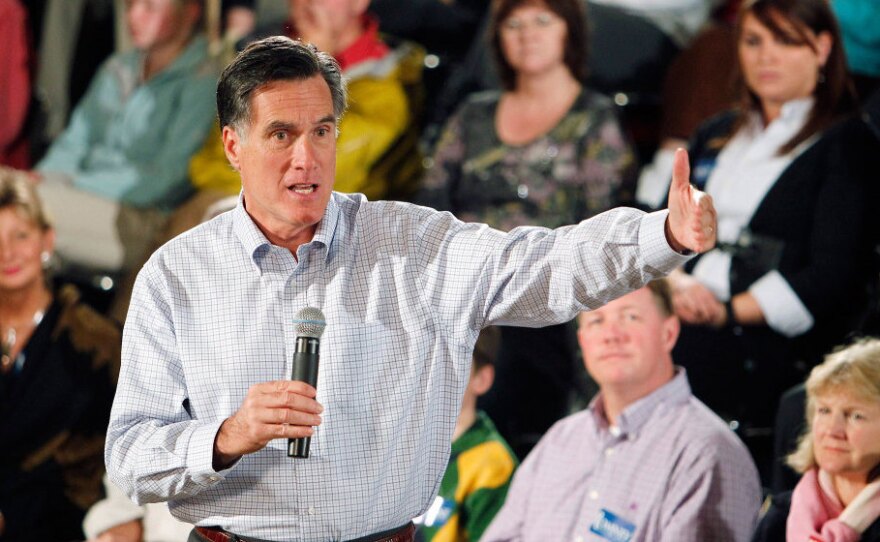After months of keeping a low profile, Republican presidential candidate Mitt Romney is stepping up his campaign activity. As his rivals' poll numbers rise and fall, Romney has been at or near the front of the pack all along — with his support stuck at around 25 percent.
The lack of a serious challenge to Romney has been one of the biggest surprises of this year's Republican primary campaign.
Conservative activist Erick Erickson, who runs the RedState website, says that while there have been nearly a dozen televised debates, there has been very little debate about Romney's record.
"A lot of the vetting that Republican voters would normally do, he hasn't gone through," Erickson says. "They've been so focused on the anti-Romney — who's going to be the alternative?"
One candidate after another has auditioned to be the anti-Romney: They have shot to the top of the polls, then fizzled. But even the best-funded of them all, Texas Gov. Rick Perry, has chosen to run ads attacking President Obama, not Romney.
While there have been a handful of anti-Romney ads from Republicans, an analyst for the Campaign Media Analysis Group says there has been "no focused negative assault on Romney." And that has given Romney a free pass to focus on the man he considers his true rival: Obama.
"I think the president fails to understand America," Romney has said. "I don't think he understands what makes America work. And I think he honestly believes that a government in Washington with well-intentioned bureaucrats can do a better job guiding the country than can free individuals and free enterprises."
Democrats On The Attack
Because there hasn't been a concerted Republican attack on Romney, the job has fallen to the Democrats.
"It's very important, I think, for them to do it, given how inept the Republican challengers are in raising the issue ... you know, he's a flip-flopper and there's a character problem," says Democratic pollster Stan Greenberg.
Greenberg says he can't think of another campaign in which the incumbent president's party has gone after a potential opponent so early.
Democrats are also trying to magnify a perceived disconnect between Romney and ordinary Americans.
In an ad made by Priorities USA, an independent Democratic super PAC, the narrator intones: "While Romney doesn't want millionaires like him to pay a nickel more, he doesn't see the big deal with letting taxes go up by $1,000 for hard-working Americans."
The Obama campaign considers Romney to be the likeliest nominee. And Romney plays that up, tweaking the president's campaign for having an "obsession" with him.
Curbing Enthusiasm?
A relatively unimpeded path to the nomination should be every candidate's dream. No one wants to end the primary season beat up and broke.
But sometimes a vigorous nominating battle is a good thing, says GOP strategist Ed Rogers.
"You want to have as much momentum, excitement and intensity as possible," he says. "Usually you get there by having a tough contest ... that produces some drama and some defining moments, and then that person comes out of the primaries with a pretty sharp edge. But if you just sort of flop around and everybody else dies, it doesn't give you the push and the momentum that you would like to have."
That's more or less what happened to Republican presidential nominee John McCain in 2008 — while Obama had a drawn-out fight to the finish with fellow Democrat Hillary Clinton and emerged a stronger candidate for it.
A relatively tame Republican primary also means Romney will never have to fight to convince conservatives he is one of them. And that worries Erickson of RedState. He's no fan of Romney, but he wants to beat Obama.
"I don't think you will ever see passion for Mitt Romney," Erickson says. "He will be the accepted nominee to beat Barack Obama, and that will be it."
Then Again ...
Although many GOP leaders believe Romney's nomination is all but inevitable, Rogers, a veteran of Republican primary politics, thinks it would be a mistake to make that judgment now.
"Leading at 25 percent, by definition, suggests that your lead is very fragile and people are still looking," Rogers says. "I think more than half of what's going to drive votes next year lies in front of us — not behind us. ... Right now, mostly it's a bunch of activists and media kind of chasing each other around, where the true rank-and-file voters really haven't engaged."
But they will soon. The first votes are cast in Iowa on Jan. 3.
Copyright 2022 NPR. To see more, visit https://www.npr.org. 9(MDAzMjM2NDYzMDEyMzc1Njk5NjAxNzY3OQ001))







